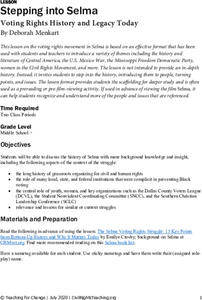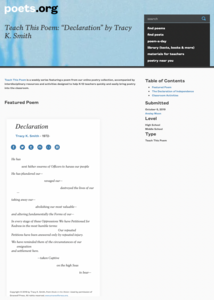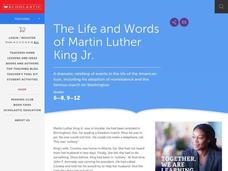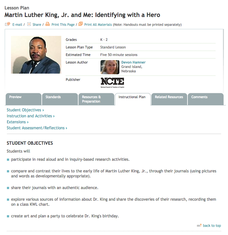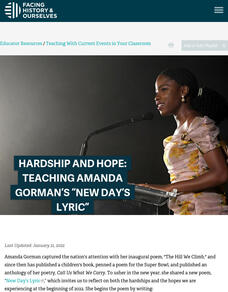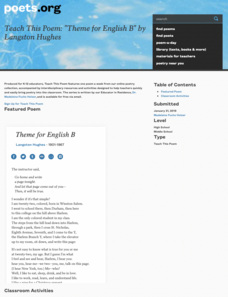Core Knowledge Foundation
Ray Charles
Introduce young learners to the read-aloud process with a short biographical passage about Ray Charles. After listening to the passage, class members respond to factual, inferential, and evaluative questions, and then create a timeline...
Historic New Orleans Collection
Exploring Primary Sources: Music in New Orleans
Looking for a new and exciting way to teach young historians the art of primary source analysis? Jazz up your instructional activity with a resource that asks class members to analyze photos, travel documents, and letters written by some...
Teaching for Change
Stepping into Selma
The 1964 Selma to Montgomery, Alabama voting rights marches are the focus of a lesson designed to introduce learners to people who took part in the Civil Rights Movement. Class members set into the role of one of the participants,...
Digital Public Library of America
The Watsons Go To Birmingham—1963 by Christopher Paul Curtis
A primary source set of photographs, videos, newspaper articles, and FBI reports provides insight into race relations during the 1960s, the Sixteenth Street Baptist Church bombing, and the murder of Emmitt Till. Designed to be used to...
Academy of American Poets
Teach This Poem: "On Being Brought from Africa to America" by Phillis Wheatley
Phillis Wheatley's poem, "On Being Brought from Africa to America" is the focus of a instructional activity that asks readers to consider how the poem is a critique of slavery. Groups comprise a list of words and phrases they notice as...
Academy of American Poets
Teach This Poem: “Declaration” by Tracy K. Smith
Tracy K. Smith's erasure poem "Declaration" challenges scholars to use their noticing skills to make connections between an engraving entitled "The Declaration of Independence" and Smith's poem. Class members record observations and...
K20 LEARN
LBJ and Voting Rights
Challenges to voting rights is not a new thing. Using President Lyndon B. Johnson's 1965 "The American Promise" speech on voting rights as a starting point, young historians research current voting rights laws and challenges.
C3 Teachers
Emancipation: Does It Matter Who Freed the Slaves?
Scholars generally agree on the emancipation of enslaved people in the United States. This inquiry-based lesson asks high schoolers to consider more than the claims of who freed the enslaved people but the significance of the issues...
Scholastic
The Life and Words of Martin Luther King, Jr.
Here is a precise article explaining chronological events that led Martin Luther King, Jr. to march for freedom and civil rights.
K12 Reader
MLK: Complete the Speech
Take a close look at a few paragraphs of Martin Luther King, Jr.s' famous speech, "I Have a Dream." Class members fill in the missing words using the bank of words provided and then respond to a question about the speech and modern day...
K12 Reader
Glossary of Non-Violence
Make sure your class is sure of terminology when referring to the non-violent methods used in the civil rights movement. This glossary includes 19 terms paired with parts of speech and definitions.
Historical Thinking Matters
Rosa Parks: 5 Day Lesson
What led to the success of the Montgomery Bus Boycott, and how might historians approach this question differently? This rich series of lessons includes a short introductory video clip, analysis of six primary source documents, and...
Historical Thinking Matters
Rosa Parks: 3 Day Lesson
How can evidence and perspective challenge even the most well-known of stories? Through primary and secondary source analysis, think-alouds, and discussion, young historians evaluate the historical narrative of Rosa Parks across multiple...
K12 Reader
Reading Comprehension: Uncle Tom’s Cabin
Introduce your high schoolers to one of the most important pieces of American literature with a reading comprehension lesson. As class members read a short passage from Harriet Beecher Stowe's Uncle Tom's Cabin, they learn about the...
K12 Reader
African American Inventors: Elijah McCoy
What do a folding iron board, lawn sprinklers, and a device for oiling engines on trains all have in common? They were all invented by Elijah McCoy, an African American inventor with 57 patents to his credit. McCoy is the subject of a...
ReadWriteThink
Martin Luther King, Jr. and Me: Identifying with a Hero
Here, young historians compare their early lives to that of Dr. Martin Luther King Jr.'s. They listen to a read aloud of a story by Dr. King's sister, and then write in the provided reflective journal template. Lastly, they share their...
Perfection Learning
I Know Why the Caged Bird Sings
A revolutionary work of literature requires a revolutionary assessment project. A series of activities on Maya Angelou's I Know Why the Caged Bird Sings includes discussion questions, a plot synopsis, and a selection of both short and...
National Park Service
Teaching with Historic Places: Discover the Jackie Robinson Ballpark
Can sports and popular culture change public opinion? That's the essential question asked by a lesson plan that looks at the role Jackie Robinson's appearance at City Island Ballpark in Daytona Beach, Florida played in the desegregation...
Literacy Volunteers of Greater Hartford
Similes Activity using Jazz (featuring Duke Ellington)
Language learners get into the swing of things with a jazzy lesson about similes. They read an article about Duke Ellington, listen to samples of his music, and then try their hand at crafting similes to describe his improvisational and...
K20 LEARN
Forgotten Figures: The Civil Rights Movement
Most have heard of Dr. Martin Luther King, Malcolm X, and Rosa Parks, but few recall Elizabeth Jennings, Samuel W. Tucker, or Ada Lois Sipuel Fisher. Young historians research and then develop a presentation about the contributions of...
Facing History and Ourselves
Hardship and Hope: Teaching Amanda Gorman's "New Day's Lyric"
Class members come together to study Amanda Gorman's poem "New Day's Lyric." After a close reading of the poem, learners watch a video of Gorman reading her poem, and then craft additional lines for the poem where they offer suggestions...
Academy of American Poets
Teach This Poem: "Theme for English B" by Langston Hughes
Langston Hughes' "Theme for English B" is featured in a lesson plan that asks pupils to first read a biography of Hughes and list things about his life they think are important. The class then reads the poem and compares what they...
Academy of American Poets
Voice
Four lessons make up a poetry unit that introduces high schoolers to spoken and written poetry. Class members also examine poems as social commentary and connect these poems to various novels and plays. A great way to incorporate poetry...
PBS
Remembering Nelson Mandela
To learn more about Nelson Mandela, young historians watch a 20 minute video that traces his life from boyhood in a small South African village, to his work as an activist opposed to Apartheid, his imprisonment, and to his leadership as...
Other popular searches
- Black History Month Projects
- Black History Month Math
- Black History Month Art
- Black History Month Rap
- Black History Month Programs
- Black History Month Music
- Black History Month Activities
- Black History Month Skits
- Black History Month Poems
- Black History Month Lessons
- Black History Month Poetry




